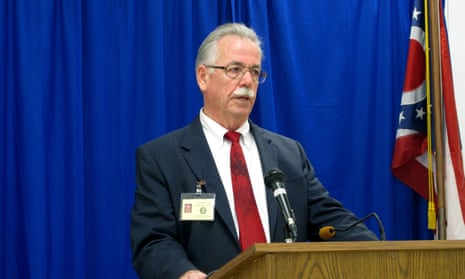Ohio called off the execution of a condemned killer with multiple health problems on Wednesday, because members of the state’s execution team were unable to find a vein to insert an IV that would administer the lethal drugs.
It was only the third time in US history that an execution has been called off after the process had begun.
The execution team first worked on both of Alva Campbell’s arms for about 30 minutes on Wednesday while he was on a gurney in the state’s death chamber, and then tried to find a vein in his right leg below the knee.
Members of the execution team used a device with a red flashing light that appeared to be a way of locating veins while also periodically comforting Campbell, patting him on the arm and shoulder.
About 80 minutes after the execution was scheduled to begin, the 69-year-old Campbell shook hands with two guards after it appeared the insertion was successful. About two minutes later, media witnesses were told to leave without being told what was happening.
Gary Mohr, head of the Ohio department of rehabilitation and correction, said the team humanely handled the attempt, but the condition of Campbell’s veins had changed since Tuesday.
He said he called off the execution after talking with the medical team. “It was my decision that it was not likely that we’re going to access veins,” Mohr said.
Campbell, who was scheduled to die for killing a teenager during a carjacking two decades ago, shook hands with execution team members and wiped away tears after being informed the execution was being called off, said his attorney, David Stebbins.

“This is a day I’ll never forget,” Campbell said, according to Stebbins.
The lawyer said the highly unusual sequence of events raised questions about the determination of the Ohio prison service to press ahead with the execution regardless of the prisoner’s condition. “We had warned them for a long time that the vein access was going to be difficult as Mr Campbell is old and sick,” Stebbins told the Guardian.
He added: “They knew it would be hard, and they might have determined this prior to starting the execution. But they did in the end do the right thing and stop the procedure in a relatively short time.”
Death penalty opponents called for the state to put a stop to executions.
The Ohio chapter of the American Civil Liberties Union immediately afterward called for a moratorium on executions in the state. Ohioans to Stop Executions said the state had been warned that 69-year-old Campbell’s health issues were likely to cause problems.
Campbell’s attorneys argued he was too ill to execute, and also should be spared because of the effects of a brutal childhood in which he had been beaten, sexually abused and tortured. They said Campbell required a walker, relied on a colostomy bag and needed breathing treatments four times a day.
Prison officials brought Campbell into the death chamber in a wheelchair and provided him a wedge pillow on the gurney, which was meant to help him breathe.
Franklin County prosecutor Ron O’Brien called Campbell “the poster child for the death penalty”. Prosecutors also said Campbell’s health claims were ironic given he faked paralysis to escape court custody the day of the fatal carjacking.
On 2 April 1997 Campbell was in a wheelchair when he overpowered a Franklin County sheriff’s deputy on the way to a court hearing on several armed robbery charges, records show.
Campbell took the deputy’s gun, carjacked the 18-year-old Charles Dials and drove around with him for several hours before shooting him twice in the head as Dials crouched in the footwell of his own truck, according to court records.
He had spent Wednesday morning praying and watching TV, said JoEllen Smith, a prisons spokeswoman.
The US supreme court a day earlier refused to stop the execution. Last week, the Republican governor, John Kasich, denied Campbell’s request for clemency.
On Wednesday night, Kasich issued a reprieve and rescheduled the execution date for 5 June 2019.
Earlier this month, Campbell lost a bid to be executed by firing squad after a federal judge questioned whether lawmakers would enact the bill needed to allow the method.
